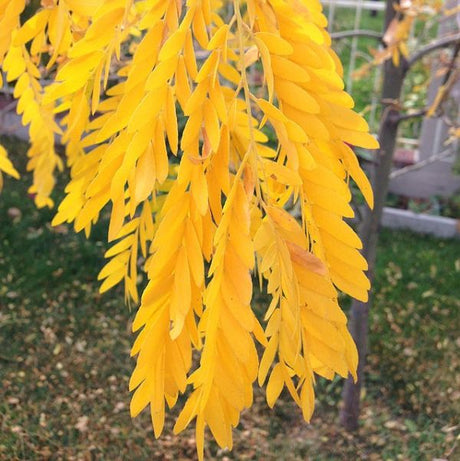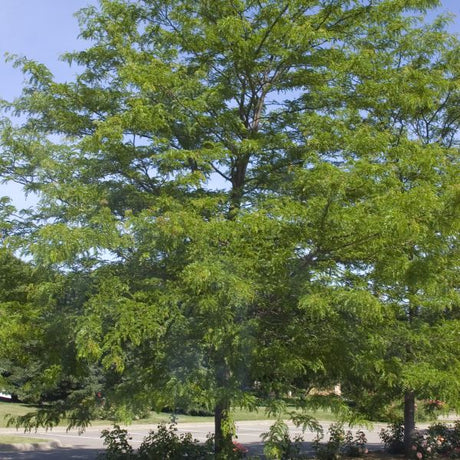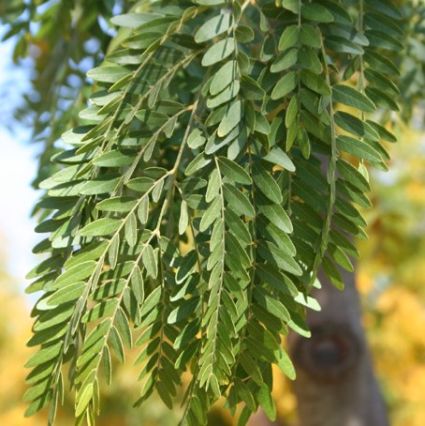-
Sold out
Gleditsia triacanthos var. inermis 'Suncole'
Regular price $14991Unit price /Unavailable -
Sold out
Gleditsia triacanthos var. inermis 'Shademaster'
Regular price $000Unit price /Unavailable -
Sold out
Robinia pseudoacacia 'Purple Robe'
Regular price $15970Unit price /Unavailable
Resilient Shade - Honeylocust Trees at Nature Hills!
Honeylocust trees (sometimes Honey Locust or simply Locust trees) excel where others fail! Browse our inventory of hardy, fast-growing Honeylocust trees that add dappled shade and a big visual impact to nearly any landscape! Their gorgeous fall color gives them late-season interest, plus the small leaflets make fall clean-up a snap!

Honeylocust Trees are in the Gleditsia family and are similar to the Black Locust Tree (Robinia). The main difference is that the Black Locust has a very fragrant or showy flower display in the spring, whereas the Honeylocust blooms are not quite as prominent, though they are lightly fragrant! Either way, pollinators will love them!
All Locusts are extremely hardy trees and fast-growing in a range of USDA planting zones from zones 4 and up. They can tolerate urban conditions, marginal soils, compacted soil, alkaline soil, heat, drought, even salted roadsides and saline conditions.
Native Black Locust trees typically have heavily thorned trunks and branches, plus seed pods that can be messy, but Honeylocust cultivars are not only thornless, but Shademaster and Sunburst® Honeylocust are seedless male clones for mess-free landscaping!

Where to Plant Locust Trees
Honeylocust trees are noted for their strong, dense wood and their low-maintenance ease. They are well regarded as effective windbreaks, tolerating strong winds and ice storms when grouped together.
Use these trees to cool the sunny side of your home for reduced cooling costs! Set up a hammock or seating area and entertain or relax in the shade!
Most Honeylocust trees are not densely leafed, so lawn grass can and will thrive under these trees! Even perennial and part shade shrubs do fantastic beneath their limbs! This is because Honeylocust trees offer filtered shade rather than dense shade, which makes them perfect as a focal point in the center of a vast yard.
Gorgeous shady street and lawn trees. Honeylocust roots go deep, so they generally won't bother pavement, sidewalks, driveways, or patios, but give them at least 15 feet of space away from your home.
Their vast adaptability makes Honeylocust the perfect tree for urban conditions, city pollution, and harsh environments where they seem to thrive as long as they are in the sun and have good drainage! Even drought does not bother these deciduous trees once established.

Caring For Honeylocust Trees
Give Honeylocust trees plenty of sunlight and plant in any well-drained soil with regular moisture during their first year. After they are established, Honeylocust only needs supplemental watering during extended periods of drought.
Top the soil with a 3–4 inch thick layer of arborist mulch, especially when planted in the lawn. Create a buffer zone extending 3–4 feet from the trunk to protect the bark from mower and weed-whacker damage.
Very low-maintenance trees, only simple pruning if needed should be performed in late winter or early spring.
Buy Honeylocust Varieties at Nature Hills!
FAQ's for Buying Locust Trees Online
What is the difference between Honeylocust and Black Locust trees?
What is the difference between Honeylocust and Black Locust trees?
Honeylocust trees are often thornless and have small, fragrant blooms, while Black Locusts have prominent flowers and thorny branches.
Are Honeylocust trees messy?
Are Honeylocust trees messy?
Many cultivated Honeylocust varieties like Shademaster and Sunburst® are seedless male clones, offering mess-free shade for your yard.
Can I plant grass under a Honeylocust tree?
Can I plant grass under a Honeylocust tree?
Yes! Honeylocusts offer filtered shade, allowing lawn grasses and many perennials to grow well beneath them.
Do Honeylocust trees tolerate poor soil?
Do Honeylocust trees tolerate poor soil?
Honeylocusts are incredibly resilient, thriving in compacted, alkaline, and even salty soils, making them perfect for urban settings.
How fast do Honeylocust trees grow?
How fast do Honeylocust trees grow?
These trees are known for their fast growth, making them excellent for quick shade and landscape establishment.











